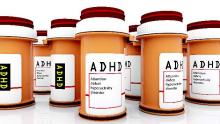The evidence for a benefit from methylphenidate in the treatment of attention-deficit/hyperactivity disorder is of very low quality, a meta-analysis showed.
The Cochrane Review of 38 parallel-group trials in 5,111 participants and 147 crossover trials in 7,134 participants found that while methylphenidate significantly reduced teacher-rated attention-deficit/hyperactivity disorder (ADHD) symptoms by 23%, compared with placebo, the evidence was of very low quality.
The change in teacher-rated symptoms corresponded to a mean difference of 9.6 points on the ADHD Rating Scale, which the authors said represented a modest improvement in ADHD symptoms.
“Methylphenidate may improve ADHD symptoms, general behavior, and quality of life in children and adolescents aged 18 years and younger with ADHD, [but] we rated the evidence to be of very low quality, and, as a result, we cannot be certain about the magnitude of the effects from the meta-analyses,” Dr. Ole Jakob Storebø of the child and adolescent psychiatry department, Region Zealand, Roskilde, Denmark, and coauthors wrote (Cochrane Database Syst Rev. 2015 Nov 25. doi: 10.1002/14651858.CD009885.pub2).
Methylphenidate also significantly reduced independent assessor-rated ADHD symptoms, although the trials were all judged to be at high risk of bias.
Researchers found that methylphenidate significantly reduced parent-rated ADHD symptoms, compared with placebo, with an impact corresponding to a mean difference of –8.2 points on the ADHD Rating Scale, which was independent of factors including treatment duration, dose, and medication status before randomization.
There also was significantly improved quality of life with methylphenidate treatment, compared with placebo, by a measure equivalent to a mean difference of 8 points on the Child Health Questionnaire, although the trials that found this were judged to be at high risk of bias.
Researchers also examined the effects of methylphenidate on general behavior, and found a significant impact on both teacher-rated and parent-rated general behavior.
One trial showed that the impact of methylphenidate was significantly greater in individuals with the inattentive subtype, compared with the combined subtype.
However, treatment with methylphenidate was associated with an increased risk of adverse events that were not serious, including a 60% increase in the incidence of sleep problems and a greater than threefold increase in decreased appetite.
“This review highlights two major issues concerning the overall completeness and applicability of the evidence of the benefits and harms of methylphenidate for children with ADHD: the dearth of trials conducted in children and adolescents in low- and middle-income countries, and the lack of follow-up beyond 6 months,” Dr. Storebø and associates wrote.
They called for better-designed trials to assess the benefits of methylphenidate. “Given the frequency of nonserious adverse events associated with methylphenidate, the particular difficulties for blinding of participants and outcome assessors point to the advantage of large, ‘nocebo tablet’ controlled trials.”
The review was funded by Region Zealand Psychiatry, Region Zealand Research Foundation, and Copenhagen University Hospital. One author declared doing speaking engagements for Novartis.


